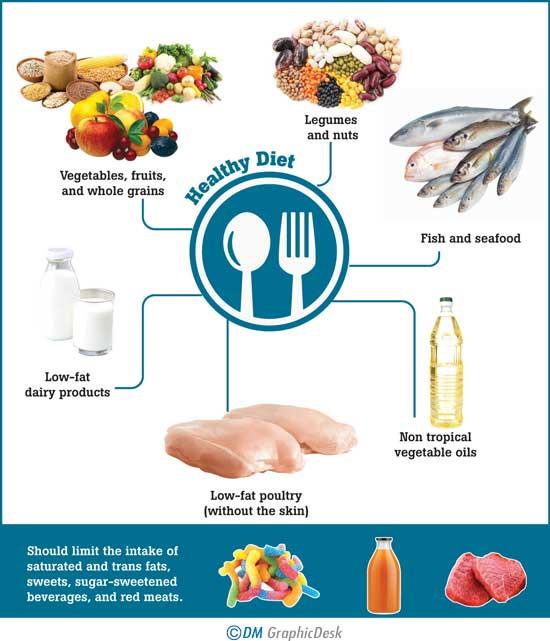
According to WHO records, increased cholesterol level is estimated to cause 2.6 million deaths (4.5% of total) and 29.7 million disability adjusted life years. Total cholesterol is a major cause of disease in both the developed and developing countries. It is also a risk factor for Ischemic heart disease and stroke. According to new research studies, nowadays most people labelled as young are susceptible to Hypercholesterolemia due to recent unhealthy diet and feeding habits and a family history of high cholesterol and obesity. This increased blood cholesterol level in the young will expose you to the long-term risks of heart and artery disease.
Cholesterol is a fatty substance and 75% of that is produced by our body and the rest comes from the diet. Cholesterol is an essential biological molecule for cell membrane structure.
Lipid metabolism and age
Plasma cholesterol is originated in three different ways; namely the intestinal absorption from diet, bile salts secreted by the liver and subsequently reabsorbed by the intestine; and cellular synthesis (primarily of hepatic origin). Cholesterols are transported in the plasma by lipoproteins which are macromolecules composed of cholesterol esters, fatty acid esters (triglycerides) and a number of polar lipids and proteins (apoproteins) that provide the necessary solubility for cholesterol transport in the plasma. There are different kinds of lipoproteins such as very low-density lipoproteins (VLDL), intermediate-density lipoproteins (IDL), low-density lipoproteins (LDL), and high-density lipoproteins (HDL) and this classification is based on their density. Among these lipoproteins HDL is known as good cholesterol while LDL is the bad cholesterol type. HDL can remove excess cholesterol from cells, including macrophages loaded with cholesterol in atherosclerotic lesions, and transport this surplus to the liver.
According to research studies, the concentration of plasma cholesterol increases with age from puberty until 45 - 55 years of age in men and then decreases. In women, it continues to increase until about 10 years later, after that there is a decline in the last decades of life. The decreases can be explained by a reduction in LDL synthesis due to liver malfunction. In men, HDL levels are fluctuated less than fluctuation in LDL cholesterol.
Causes of high cholesterol in children and teens
1. An unhealthy diet
2. A family history of high cholesterol
3. Obesity
Among these main causes of increased blood cholesterol, level in blood of young ages, diet is playing more significant role.
Diet
These days most people including those in the young age and adults are addicted to eating fast and junk foods due to their busy lifestyle. Fast foods including potato chips, burgers and processed meat consumption and have been associated with adverse health outcomes including increased risk of excess weight, blood cholesterol level, poor dietary quality, and insulin resistance because, it contains low unsaturated : saturated fat ratio, greater portion sizes and lower fibre content. Other than that, Foods which contain saturated fat also cause an increase in cholesterol while saturated fat is mostly found in animal-based food products such cheese, milk, egg yolk, shellfish, organ meat, sardines, full-fat yogurt and butter. Moreover, palm oil like plant-based foods also contain saturated fat. Another important causative fat type that raises cholesterol level in blood is trans-fats or trans-fatty acids which are generated as a result of hydrogenation process. Some trans-fats are found in animal products. These fats are often found in peanut butter, margarine, and potato chips. Therefore, parents should take the responsibility in feeding their children with healthy homemade food and made their offspring avoid the consumption of fast or junk foods.
Research findings
According to the research studies, fruits and vegetables are rich in dietary fibre which contribute to decrease LDL concentrations. Soluble fibre is a type of fibre found in plant foods and they can bind cholesterol in the intestine and remove it from the body. Research studies reveal that consuming soluble fibre helps to lower total and LDL-cholesterol.
(The writer holds a MSc. Degree in Industrial and Environmental Chemistry from the University of Kelaniya and a BSc. in Food Production and a Technology Management degree from the Wayamba University of
Sri Lanka)

 According to WHO records, increased cholesterol level is estimated to cause 2.6 million deaths (4.5% of total) and 29.7 million disability adjusted life years. Total cholesterol is a major cause of disease in both the developed and developing countries. It is also a risk factor for Ischemic heart disease and stroke. According to new research studies, nowadays most people labelled as young are susceptible to Hypercholesterolemia due to recent unhealthy diet and feeding habits and a family history of high cholesterol and obesity. This increased blood cholesterol level in the young will expose you to the long-term risks of heart and artery disease.
According to WHO records, increased cholesterol level is estimated to cause 2.6 million deaths (4.5% of total) and 29.7 million disability adjusted life years. Total cholesterol is a major cause of disease in both the developed and developing countries. It is also a risk factor for Ischemic heart disease and stroke. According to new research studies, nowadays most people labelled as young are susceptible to Hypercholesterolemia due to recent unhealthy diet and feeding habits and a family history of high cholesterol and obesity. This increased blood cholesterol level in the young will expose you to the long-term risks of heart and artery disease.